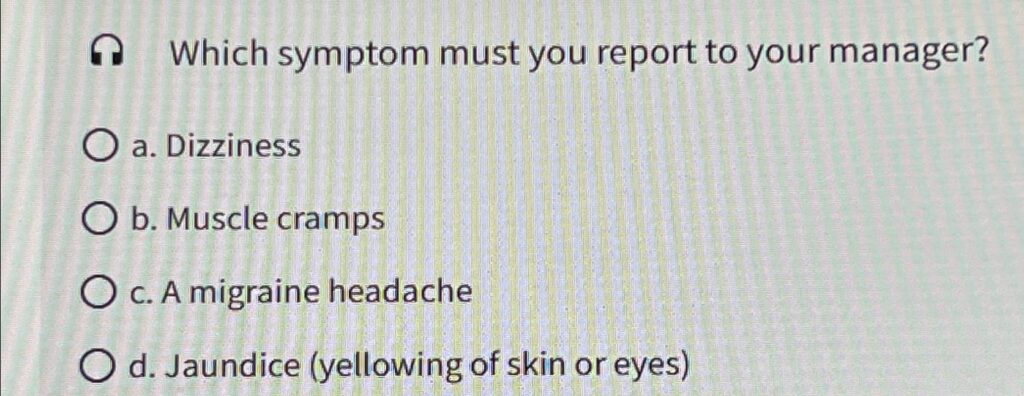Reportable Symptoms for Food Handlers
As a food handler, it is crucial to prioritize food safety and prevent the spread of foodborne illnesses. One of the most effective ways to maintain a safe and healthy work environment is by reporting certain symptoms to your manager. This article will discuss the symptoms that food handlers must report, the importance of open communication with managers, and the consequences of working while sick.
Symptoms to Report to Your Manager
According to the FDA Food Code, food handlers must report the following symptoms to their managers:
- Vomiting
- Diarrhea
- Jaundice (yellowing of the skin or whites of the eyes)
- Sore throat with fever
- Open, infected wound
These symptoms could indicate the presence of a foodborne illness or a contagious condition that can easily spread to customers and coworkers through food handling. It is essential to understand the significance of each symptom and why reporting them is crucial for maintaining food safety standards.
Vomiting and Diarrhea
Vomiting and diarrhea are the most common symptoms of foodborne illness and are highly contagious. These bodily fluids contain the pathogens responsible for the illness, which can easily contaminate food or food-contact surfaces, even with proper handwashing. If you experience vomiting or diarrhea, you must stay home and rest until you are symptom-free for at least 24 hours before returning to work.
Jaundice
Jaundice is a condition that causes the skin and whites of the eyes to turn yellow due to a high level of bilirubin, a yellow-orange substance, in the blood. It is often a sign of a liver infection caused by the hepatitis A virus, which is highly contagious. If you develop jaundice, you must stay home until you have fully recovered and are no longer contagious.
Sore Throat with Fever
A sore throat accompanied by a fever could indicate the presence of a foodborne illness or a contagious condition. It is essential to report this symptom to your manager and refrain from working until you have recovered.
Open, Infected Wound
An open, infected wound can be a source of contamination in a food handling environment. Symptoms of an infected wound include pain, swelling, redness, and pus or fluid discharge. If you have an infected wound, you must cover it with a waterproof bandage and a single-use glove (if the wound is on your hand) before returning to work. Some foodservice operations may require you to wear a brightly colored bandage over the wound to easily identify it if it falls into food.
Reportable Illnesses for Food Handlers
In addition to reporting symptoms, food handlers must also notify their managers if they have been diagnosed with or exposed to certain foodborne illnesses. These illnesses are known as the “Big 6” and include:
- Norovirus
- Hepatitis A
- Shigella
- Shiga toxin-producing Escherichia Coli (STEC)
- Salmonella Typhi (typhoid fever)
- Salmonella (nontyphoidal)
These pathogens are highly contagious and can cause severe foodborne illnesses. If you have been diagnosed with or exposed to any of these illnesses, your manager or the person in charge must notify the local health department. Depending on the illness, your manager will determine when it is safe for you to return to work.
Importance of Open Communication with Managers
Open communication with your manager about your health is essential for maintaining a safe and healthy work environment. While you might feel inclined to work through mild symptoms, it is crucial to prioritize the safety of your customers and coworkers. By reporting symptoms and illnesses promptly, you can help prevent the spread of foodborne illnesses and protect the reputation of your establishment.Managers have a responsibility to educate their employees about the importance of staying home when experiencing reportable symptoms or illnesses. They should encourage their staff to take responsibility and openly report any health concerns, assuring them that there will be no pressure to work when sick. By fostering a culture of open communication and prioritizing food safety, managers can create a healthier and more productive work environment.
Consequences of Working While Sick
Working while experiencing reportable symptoms or illnesses can have severe consequences for both the employee and the establishment. Some of the potential consequences include:
- Spreading foodborne illnesses to customers and coworkers
- Facing disciplinary action from the manager or health department
- Damaging the reputation of the establishment
- Risking the health and safety of vulnerable populations, such as children, the elderly, or immunocompromised individuals
It is crucial to prioritize your health and the health of those around you by staying home when sick and reporting any reportable symptoms or illnesses to your manager.
FAQ Section
What symptoms must food handlers report to their managers?
Food handlers must report vomiting, diarrhea, jaundice, sore throat with fever, and open, infected wounds to their managers.
Why is it important for food handlers to report these symptoms?
Reporting these symptoms is crucial because they could indicate the presence of a foodborne illness or a contagious condition that can easily spread to customers and coworkers through food handling.
How long must food handlers stay home if they experience vomiting or diarrhea?
Food handlers must stay home until they are symptom-free for at least 24 hours before returning to work.
What is jaundice, and why is it important for food handlers to report it?
Jaundice is a condition that causes the skin and whites of the eyes to turn yellow due to a high level of bilirubin in the blood. It is often a sign of a liver infection caused by the hepatitis A virus, which is highly contagious. Food handlers must stay home until they have fully recovered and are no longer contagious.
What should food handlers do if they have an open, infected wound?
Food handlers with an open, infected wound must cover it with a waterproof bandage and a single-use glove (if the wound is on their hand) before returning to work. Some foodservice operations may require them to wear a brightly colored bandage over the wound to easily identify it if it falls into food.
What are the “Big 6” foodborne illnesses that food handlers must report to their managers?
The “Big 6” foodborne illnesses that food handlers must report are norovirus, hepatitis A, Shigella, Shiga toxin-producing Escherichia Coli (STEC), Salmonella Typhi (typhoid fever), and Salmonella (nontyphoidal).
What are the consequences of food handlers working while sick?
Working while experiencing reportable symptoms or illnesses can lead to spreading foodborne illnesses to customers and coworkers, facing disciplinary action from the manager or health department, damaging the reputation of the establishment, and risking the health and safety of vulnerable populations.
Conclusion
Reporting symptoms and illnesses to managers is a crucial aspect of maintaining food safety and preventing the spread of foodborne illnesses. By understanding the symptoms that must be reported, the importance of open communication with managers, and the consequences of working while sick, food handlers can help create a safer and healthier work environment for everyone involved.For more detailed information on food safety regulations and best practices, you can refer to the FDA Food Code.



